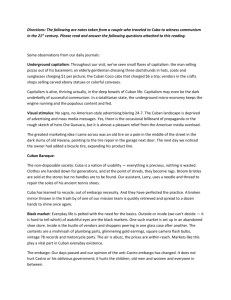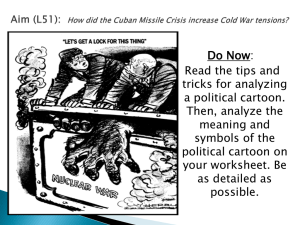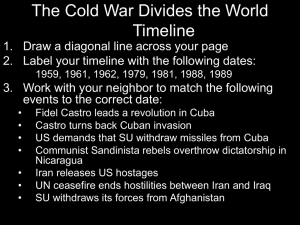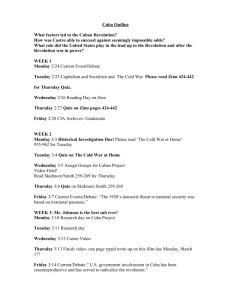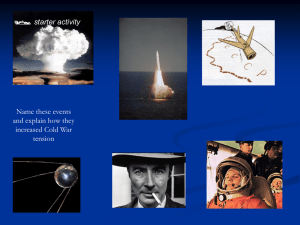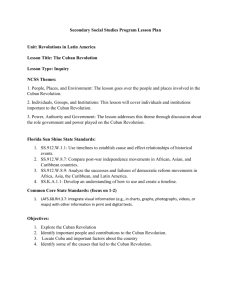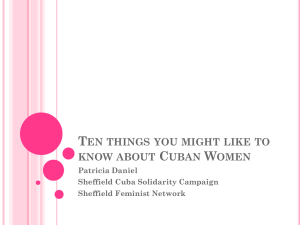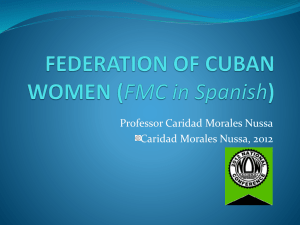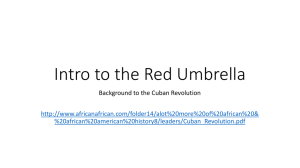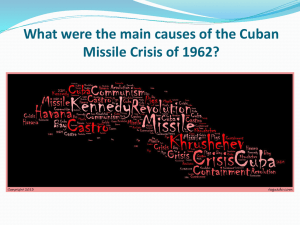castro historiography and paper 1
advertisement
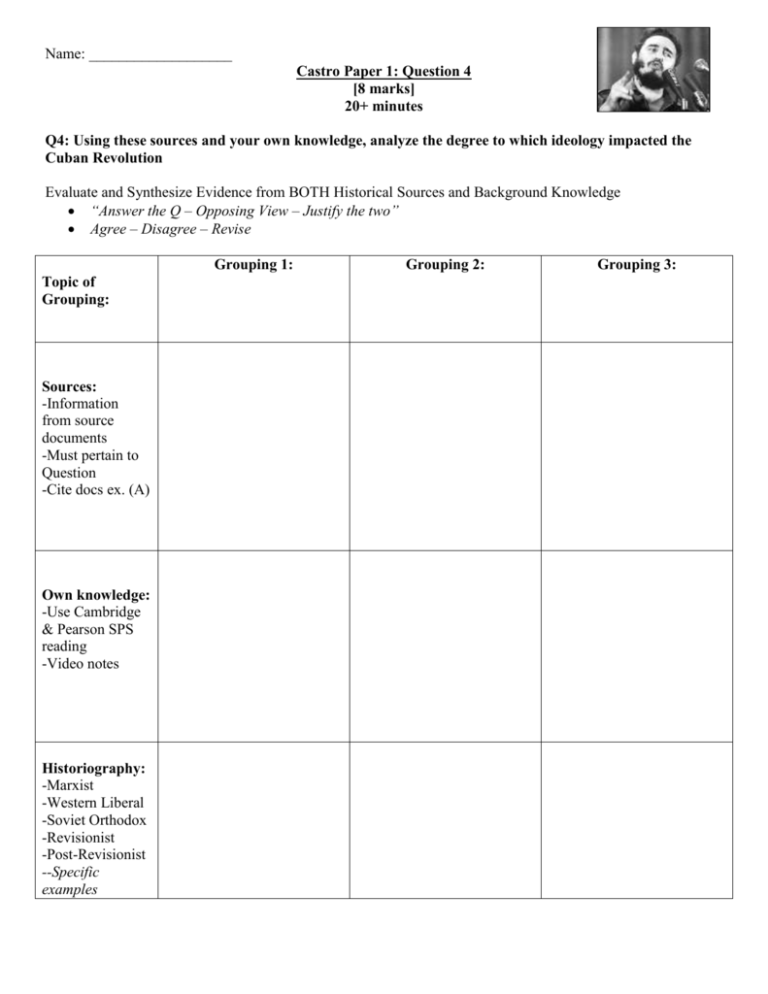
Name: ___________________ Castro Paper 1: Question 4 [8 marks] 20+ minutes Q4: Using these sources and your own knowledge, analyze the degree to which ideology impacted the Cuban Revolution Evaluate and Synthesize Evidence from BOTH Historical Sources and Background Knowledge “Answer the Q – Opposing View – Justify the two” Agree – Disagree – Revise Grouping 1: Topic of Grouping: Sources: -Information from source documents -Must pertain to Question -Cite docs ex. (A) Own knowledge: -Use Cambridge & Pearson SPS reading -Video notes Historiography: -Marxist -Western Liberal -Soviet Orthodox -Revisionist -Post-Revisionist --Specific examples Grouping 2: Grouping 3: Q4: Using these sources and your own knowledge, analyze the degree to which ideology impacted the Cuban Revolution What is you argument? Topic Sentence Development: o 1st paragraph: o 2nd paragraph: o 3rd paragraph (Thesis): Write Body 3: Historiography Fidel Castro “Condemn me, it doesn't matter, history will absolve me” Chomsky, Avi. "Review: Recent Historiography of Cuba." Latin American Research Review 29.3 (1994): 220-36. JSTOR. Web. 17 Mar. 2014. <http://www.jstor.org/stable/10.2307/2503951?ref=searchgateway:f65928f23f1b475f16d6a4788f79e450 In a 1991critique of “Cubanology," Marifeli Perez-Stable lamented the extent to which the field of Cuban studies has been distorted by the ideological perspectives of scholars, whether supporters or opponents of the Cuban Revolution. Few works on Cuban history have been translated from Spanish into English or vice versa, and U.S. and Cuban scholars engage in virtually no collaborative work. Worse yet, little scholarly dialogue has taken place between Cuban and U.S. historians on the topics under review, and they rarely cite one other. Available sources for the study of Cuban history have only begun to be tapped. Some areas, such as U.S.-Cuba relations, have been well studied, but social history (including the study of women, labor, and race) is an area where much remains to be done, despite promising beginnings. Arthur Schlesinger Jr. (d. 2007): o Martin, Douglas. "Arthur Schlesinger, Historian of Power, Dies at 89." New York Times, March 1, 2007. http://www.nytimes.com/2007/03/01/us/01cnd-schlesinger.html?pagewanted=all&_r=0 (accessed March 17, 2014). The historian whose more than 20 books shaped discussions for two generations about America’s past, and who himself was a provocative, unabashedly liberal partisan, most notably while serving in the Kennedy White House. Mr. Schlesinger worked on both Kennedy brothers’ presidential campaigns, and some critics suggested he had trouble separating history from sentiment. In the McCarthy era and beyond, he was a leader of anti-Communist liberals and a fierce partisan. He called for the impeachment of Richard M. Nixon, which never happened, and just as passionately denounced that of President Bill Clinton, when it did. Mr. Schlesinger distinguished himself early in the administration by being one of the few in the White House to question the invasion of Cuba planned by the Eisenhower administration. After President Kennedy was assassinated, President Lyndon B. Johnson kept Mr. Schlesinger on but gave him virtually nothing to do. He resigned in January 1964. Mr. Schlesinger soon wrote an article saying that John Kennedy had not really wanted Mr. Johnson as his vice-presidential candidate but that he had picked him for political reasons. Carollee Bengelsdorf, Cuba In Transition: Crisis And Transformation, 199& The Problem of Democracy in Cuba: Between Vision and Reality, 1994 "An excellent and brutally honest analysis of the contradictions in Cuba's Marxist approach to democracy. While clearly highlighting the problems, it does so in a non-anatagonistic fashion while also recognizing the goals, actual accomplishments and other factors facing the Cuban Revolution."--Richard Levy, Salem State College Analyzes the nature of participatory democracy in a revolutionary context, examines Cuba's economic prospects in a rapidly changing international environment, and offers a series of studies of the texture of everyday life in the Western Hemisphere's only socialist country. 21st Century Historiography Sebastian Balfour, Castro, 2nd ed. 2000, 3rd ed. 2008: o “Few political figures in history can have divided opinion as much as Fidel Castro. His demonization or canonization has left little space for balanced accounts of his life and work, at least outside academia and serious journalism.” p. 197 o If the Cuban books on Castro tend to be hagiographies (), the portraits of him by Cubans in exile are more in the way of demonologies. He is a legendary hero on the one hand and a power-hungry opportunist on the other, and there is little published in Spanish that occupies the middle gound” p. 202 o The harshest judgments have often proceeded from erstwhile supporters. A leading activist of the 26th of July Movement, Carlos Franqui, declared in 2006: “it is an incontrovertible truth that the triumph of the Castroist Revolution has been, and still is, the most tragic event in the history of Cuba.” p.197 o The liberal school of thinking, such as the US-based Association for the Study of the Cuban Economy (ASCE) tends to view economic policy in Cuba from the perspective of the ‘end of history’, liberal consensus whereby economic liberalization is the only game in town.” p.197 Peter Roman, People's Power: Cuba's Experience with Representative Government (Critical Currents in Latin American Perspective Series), 2003 o A theoretical, historical and analytical account of representative government that has emerged in Cuba since the 1970's o The Cuban model was built on theoretical foundations derived from Rousseau, Marx, and Lenin, and the historical precedents of the 1871 Paris Commune, the 1905 and 1917 soviets, and the pre- and post-Stalin years of the Soviet Union. Isaac Saney, Cuba: A Revolution in Motion, 2004: o The author argues that the country's political stability is not merely the result of authoritarianism, but that the Cuban political system incorporates important elements of democracy that encourage participation and help generate public support. o The working class was critical to the success of the Cuban revolutionary struggle. The labor movement was a dominant force in the political development and direction of the revolution. Workers were prominent actors throughout the urban wing of the revolutionary struggle, which complemented the rural armed struggle. Richard Gott, Cuba: A New History, 2004: o Nationalism was more important in Castro's ideology than socialism, with Marti being mroe influential than Marxist ideology, with its emphasis on class conflict. o Communists were allowed to operate legally under Batista and even to launch their own newspaper, Hoy. In return, the Communists promised Batista the political support he lacked. During the second world war, Batista himself became President of Cuba and ruled as a social democrat, welcoming Communists into his government. o He expects little change in Cuba in the years ahead, even after Fidel Castro dies, because "Cuba has already been governed for several years by a post-Castro government ... Castro himself is now largely absent from the scene ... He remains a figure from all our yesterdays, grey-bearded but eternally youthfully, like an ageing rock star." Hobart Spalding o Labor and working class historian (affiliated with: Socialist and Left-forum publications) o Member of the North American Congress on Latin America (NACLA)
